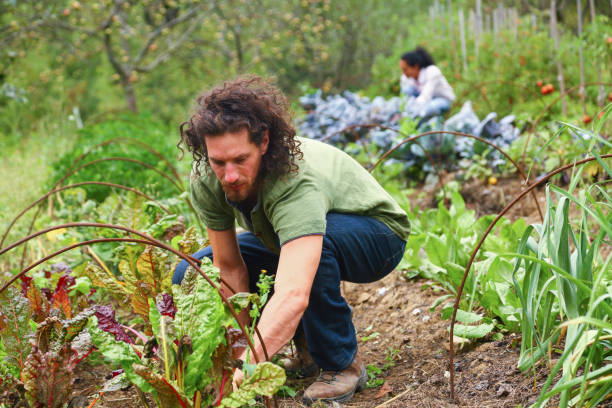Agriculture Courses in 2025: Learning for a Sustainable Future
Agriculture remains vital to food security and environmental sustainability. In 2025, a range of training programs may be available for individuals interested in crop science, agri-business, soil management, and modern farming technologies—offering insight into both traditional and innovative agricultural practices.

Emerging Course Opportunities in Agricultural Education
The agricultural education sector is experiencing significant transformation as we move toward 2025. Universities, community colleges, and specialized agricultural institutes are redesigning their curricula to incorporate sustainable farming practices, precision agriculture, and climate-resilient crop management. Traditional programs in animal husbandry, crop science, and soil management are being supplemented with courses in agricultural technology, vertical farming, and regenerative agriculture. Online learning platforms are also expanding their offerings, providing flexible certificate programs and micro-credentials that allow students to build specialized skill sets without committing to full degree programs.
Additionally, industry partnerships are creating practical, hands-on training opportunities through internships and apprenticeships with progressive farming operations, agricultural technology companies, and food processing facilities. These collaborations ensure that course content remains relevant to real-world agricultural challenges while giving students valuable workplace connections.
Innovative Training Programs Addressing Agricultural Challenges
In response to unprecedented environmental challenges, training programs in 2025 are increasingly focused on climate-smart agriculture techniques. Specialized courses in drought-resistant crop varieties, water conservation methods, and carbon sequestration practices are becoming standard components of agricultural education. Short-term intensive workshops on specific technologies—such as drone operation for crop monitoring, IoT sensor deployment, and automated irrigation systems—allow farmers to quickly acquire practical skills applicable to their operations.
Government-sponsored extension programs are also being revitalized, with mobile training units bringing education directly to rural communities. These programs offer practical demonstrations and field training in sustainable farming methods, pest management without synthetic chemicals, and improved post-harvest handling techniques to reduce food waste. Many of these initiatives incorporate indigenous knowledge systems and traditional practices, recognizing their value in building resilient food systems.
Specialized Agricultural Disciplines Gaining Prominence
By 2025, several agricultural specializations are experiencing heightened demand and educational focus. Agroecology courses, which teach integrated approaches to sustainable farming ecosystems, are becoming foundational in many agricultural programs. Urban agriculture training, covering everything from rooftop gardens to community food projects, is expanding rapidly as cities seek greater food security and reduced carbon footprints from transportation.
Agricultural data science represents another growth area, with programs teaching students to collect, analyze, and apply big data for farming optimization. Courses in agricultural entrepreneurship and direct marketing are helping small-scale farmers develop viable business models in competitive markets. Biotechnology education focused on sustainable applications—such as developing drought-resistant crop varieties and biological pest controls—continues to advance despite ongoing regulatory debates.
Technology Integration in Agricultural Education
Technology is transforming both the content and delivery methods of agricultural education. Virtual reality simulations now allow students to practice operating complex farm equipment, experiment with different planting techniques, or troubleshoot irrigation systems without real-world consequences. Augmented reality applications enable learners to identify plant diseases, soil deficiencies, or optimal harvesting times through smartphone cameras with real-time information overlays.
Digital classrooms connect students with international agricultural experts, providing global perspectives on farming challenges and solutions. Advanced modeling software helps learners understand complex ecological interactions and predict crop outcomes under various climate scenarios. These technological tools are making high-quality agricultural education more accessible, particularly in regions where hands-on training facilities may be limited or where working farmers need continuing education without leaving their operations.
Strong Career Growth and Compensation in Agricultural Sectors
The agricultural job market in 2025 reflects growing recognition of the sector’s importance to global sustainability goals. Graduates with specialized agricultural knowledge are finding diverse career pathways beyond traditional farming, including roles in agricultural technology firms, food processing companies, environmental consulting, and government regulatory agencies. The integration of digital technologies has created new positions for agricultural data analysts, precision farming consultants, and sustainability managers within larger agricultural operations.
Compensation trends show promising developments, particularly for roles combining agricultural expertise with technological proficiency or business acumen. Entry-level positions for graduates with bachelor’s degrees in agricultural sciences typically range from $45,000 to $65,000 annually, while those with specialized master’s degrees or experience in high-demand areas like agricultural data science or sustainable water management can command salaries of $75,000 to $110,000. Agricultural consultants and farm managers with demonstrated ability to increase productivity while reducing environmental impacts are particularly well-compensated.
| Career Path | Average Salary Range | Growth Outlook (2025) | Required Education |
|---|---|---|---|
| Agricultural Engineer | $75,000-$95,000 | Strong (12% growth) | Bachelor’s or Master’s degree |
| Precision Agriculture Specialist | $65,000-$85,000 | Very Strong (15% growth) | Bachelor’s degree + certifications |
| Sustainable Farm Manager | $60,000-$90,000 | Moderate (8% growth) | Bachelor’s + experience |
| Agricultural Data Analyst | $70,000-$100,000 | Strong (14% growth) | Bachelor’s or Master’s degree |
| Urban Agriculture Coordinator | $45,000-$65,000 | Strong (10% growth) | Associate’s or Bachelor’s degree |
| Agricultural Policy Advisor | $80,000-$120,000 | Moderate (7% growth) | Master’s or PhD preferred |
Prices, rates, or cost estimates mentioned in this article are based on the latest available information but may change over time. Independent research is advised before making financial decisions.
Accessibility and Funding for Agricultural Education
Access to agricultural education is expanding through scholarship programs, distance learning options, and industry-funded initiatives. Recognizing the aging farmer population in many regions, governments are increasingly subsidizing agricultural education for young people entering the field. Financial aid specifically targeted at sustainable agriculture practitioners is growing, with preferential loan terms and grant opportunities for those implementing environmentally beneficial practices.
Many agricultural corporations are establishing educational foundations that sponsor students in exchange for work commitments after graduation. Community-supported agriculture programs are partnering with educational institutions to create apprenticeships that combine formal learning with practical experience. These diverse funding pathways are critical in ensuring that agricultural education remains accessible to individuals from varied backgrounds, including those from historically underrepresented farming communities.
The agricultural education landscape of 2025 presents unprecedented opportunities for those seeking to contribute to sustainable food production. With courses increasingly balancing traditional knowledge, technological innovation, and ecological awareness, graduates are well-positioned to address the complex challenges facing global agriculture while building rewarding careers in this essential sector.




